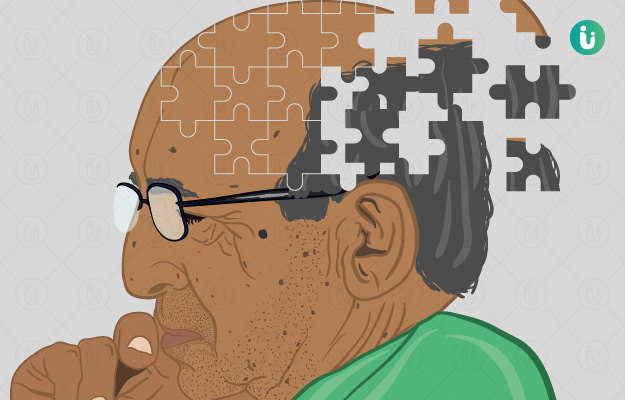What is dementia?
Dementia is a clinical syndrome characterised by a significant decline in cognitive functioning. It is a collection of symptoms that occur in a number of diseases. It features loss of cognitive and behavioural functioning that affects one’s daily life. It is a global crisis and more than 4 million Indians affected by some form of dementia.
What are its main associated signs and symptoms?
Symptoms of dementia usually show insidious onset and gradual progression.
- Commonly associated signs and symptoms include:
- Reduced learning ability
- Decline in memory
- Personality and mood changes
- Psychomotor slowing
- Early stage symptoms: depression and apathy
- Later stage symptoms: agitation, irritability, delusion and wandering
- Final stage symptoms: incontinence, disturbance in gait, difficulty in swallowing and muscular spasms
What are its main causes?
Extensive damage of nerve cells leads to symptoms of dementia.
The most common cause is Alzheimer’s disease which involves short-term memory deficits.
Other common causes of dementia include:
- Vascular dementia: This occurs as a result of damage to the blood vessels that supply the brain.
- Lewy body dementia: Lewy bodies are abnormal clumps of protein that affect cognitive functioning of a person.
- Frontotemporal dementia: Degeneration of nerve cells in the areas of the brain that control personality, language and behaviour.
- Mixed dementia: Studies suggest that people aged 80 years and above have a combination of the above-mentioned dementias.
- Other uncommon causes: Huntington’s disease, Parkinson’s disease, traumatic brain injury, metabolic and endocrine disorders, adverse reaction to medications, poisoning and brain tumours.
How is it diagnosed and treated?
Medical history of the patient and physical examination is required for the diagnosis of dementia.
Assessment of cognitive function is done during the consultation, but may also require additional tests.
Mini-Mental State Examination (MMSE) is the most widely used test for assessing cognitive function.
Further investigations, if required, may include:
- Blood tests
- MRI or CT scan of brain
- EEG (electroencephalogram)
Treatment with medications shows very little response. Medications prescribed are for increasing the chemicals that transmit nerve signals. These are found to be useful only during the early to middle stages of dementia.
Antidepressants are useful in case of disturbed sleep.
The use of antipsychotics has been shown to pose a greater risk of death.
Supportive care plays a major role in the management of patients with dementia. As the symptoms progress, the need for assistance also increases.

 Doctors for Dementia
Doctors for Dementia  OTC Medicines for Dementia
OTC Medicines for Dementia
 Dementia articles
Dementia articles

 Home Remedies for Dementia
Home Remedies for Dementia
 Homeopathic Treatment of Dementia
Homeopathic Treatment of Dementia









 Dr. Rachita Narsaria
Dr. Rachita Narsaria











